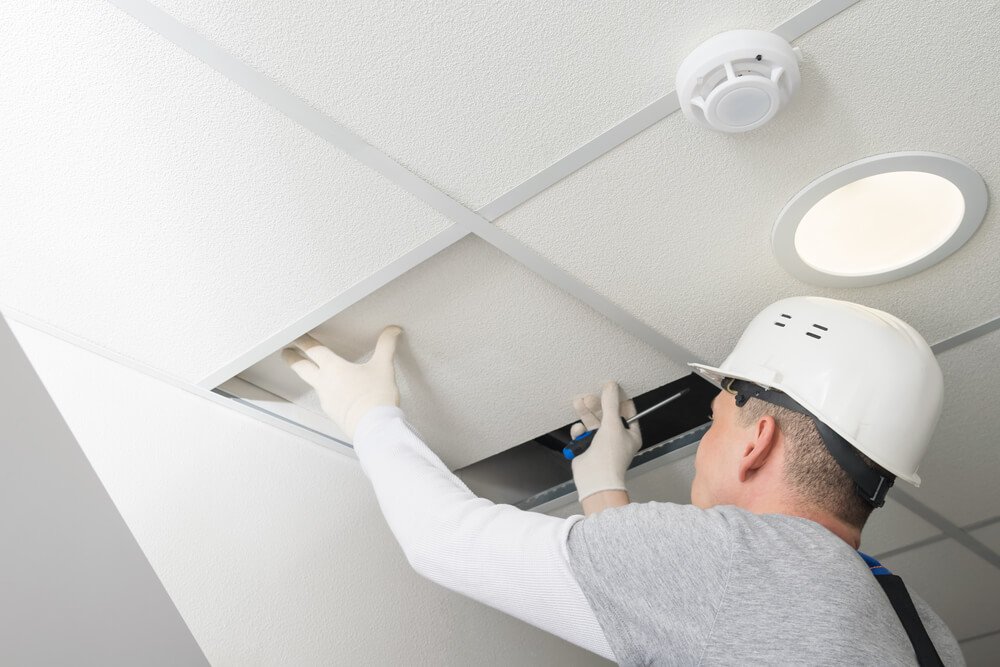Acoustical ceiling tiles are essential components in creating environments that prioritize sound control, comfort, and aesthetic appeal. These tiles are designed to absorb, diffuse, or block sound, contributing to improved acoustics within a space. In this exploration, we’ll delve into various types of acoustical ceiling tiles, each offering unique characteristics to meet specific acoustic and design requirements.
1. Mineral Fiber Ceiling Tiles:
Overview:
Mineral fiber ceiling tiles are a common and versatile choice. They are made from mineral wool fibers derived from natural minerals like basalt.
Characteristics:
- Sound Absorption: Excellent sound absorption properties.
- Fire Resistance: Many mineral fiber tiles are inherently fire-resistant.
- Affordability: Generally cost-effective.
Applications:
Ideal for offices, classrooms, commercial spaces, and areas where sound control is essential.
2. Wooden Ceiling Tiles:
Overview:
Wooden ceiling tiles add warmth and a natural aesthetic to spaces while providing acoustic benefits.
Characteristics:
- Aesthetic Appeal: Enhances the visual appeal of a space.
- Sound Absorption: Some wood materials offer good sound absorption.
- Customization: Various wood species and finishes available.
Applications:
Popular in auditoriums, theaters, concert halls, and high-end commercial spaces.
3. Metal Ceiling Tiles:
Overview:
Metal ceiling tiles come in a variety of designs and finishes, offering both aesthetics and acoustical properties.
Characteristics:
- Reflective Properties: Some metal surfaces can reflect sound.
- Durability: Resistant to moisture and durable.
- Design Versatility: Available in various shapes and finishes.
Applications:
Commonly used in modern and industrial designs for offices, airports, and open spaces.
4. Gypsum Ceiling Tiles:
Overview:
Gypsum ceiling tiles are made from the mineral gypsum and offer a smooth and uniform surface.
Characteristics:
- Fire Resistance: Gypsum is inherently fire-resistant.
- Sturdy Construction: Provides a sturdy and durable ceiling surface.
- Smooth Finish: Ideal for creating a polished appearance.
Applications:
Suitable for various commercial and residential spaces.
5. Fiberglass Ceiling Tiles:
Overview:
Fiberglass ceiling tiles are made from fine glass fibers and are known for their lightweight and versatile characteristics.
Characteristics:
- Lightweight: Easy to handle and install.
- Moisture Resistance: Resistant to moisture and humidity.
- Customizable: Can be painted or coated for added design flexibility.
Applications:
Ideal for environments with specific moisture and humidity requirements.
6. Fabric-Wrapped Ceiling Panels:
Overview:
Fabric-wrapped acoustical panels consist of a core material wrapped in an acoustically transparent fabric.
Characteristics:
- Design Versatility: Wide range of fabric colors and textures.
- Broad Frequency Absorption: Effective at absorbing sound across various frequencies.
- Customization: Can be tailored to match interior design.
Applications:
Commonly used in conference rooms, studios, home theaters, and spaces with a focus on aesthetics.
7. Perforated Metal Ceiling Tiles:
Overview:
Perforated metal ceiling tiles are designed with small holes, providing both acoustic performance and visual interest.
Characteristics:
- Acoustic Performance: Effective in controlling sound reverberation.
- Visual Interest: Unique perforation patterns add a decorative element.
Applications:
Ideal for spaces where both acoustics and aesthetics are important.
8. PVC Ceiling Tiles:
Overview:
PVC ceiling tiles are made from polyvinyl chloride, offering a lightweight and moisture-resistant solution.
Characteristics:
- Moisture Resistance: Suitable for high humidity environments.
- Versatility: Available in various colors and finishes.
- Low Maintenance: Easy to clean and maintain.
Applications:
Commonly used in bathrooms, kitchens, and areas with high humidity.
9. Acoustic Clouds:
Overview:
Acoustic clouds are suspended, cloud-like structures designed for both acoustic performance and visual appeal.
Characteristics:
- Sound Absorption: Enhances acoustics in open spaces.
- Architectural Interest: Serves as a visually striking design element.
- Customizable Shapes: Can be tailored to fit specific design requirements.
Applications:
Ideal for large open spaces, such as auditoriums, atriums, and lobbies.
10. Wood Wool Ceiling Tiles:
Overview:
Wood wool ceiling tiles are composed of wood fibers and cement, combining natural aesthetics with sound-absorbing properties.
Characteristics:
- Sound Absorption: Effective in controlling reverberation.
- Eco-Friendly: Made from sustainable materials.
- Customizable: Available in various shapes and sizes.
Applications:
Suitable for both residential and commercial spaces seeking a natural and eco-friendly aesthetic.
Conclusion:
The diverse range of acoustical ceiling tiles allows for customization to meet specific acoustic, aesthetic, and functional requirements. When choosing the right type of ceiling tile, consider the unique needs of the space, whether it’s an office, auditorium, or residential area. By understanding the characteristics of different acoustical ceiling tiles, you can create environments that not only look impressive but also provide optimal sound control and comfort.


